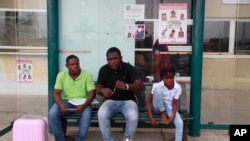Children in Guinea start the school year Monday after a five-month delay due to Ebola. Liberia plans to reopen schools next month. It’s a sign of progress as those two countries turn the tide against the epidemic, but not everyone is sure the countries are ready.
“Papa, when will we return to school?” Sampson Wesseh’s kids ask him every day.
He “welcomes” the Liberian government’s decision to reopen schools in February. Authorities shut them back in July as Ebola cases surged.
“My kids have been sitting home doing nothing, playing, running here and there," Wesseh says, "Nothing like education has been going on…The more the children sit home, the more they get dull.”
Authorities say schools will have all the necessary safety measures like thermometers and chlorine for hand washing.
But some Liberian parents say they may keep their kids home a while longer.
Mother Christine Thomas says she wants the World Health Organization to declare Liberia Ebola-free first.
“My fear here is that if the children go to school and they come down with Ebola it will not be too good for the parents. We will be feeling bad," she explains. "So we are hoping and praying that there will be a little bit of debate on the opening of schools.”
Risky decision?
In Guinea, teachers express the same concern. They worry about how to limit contact in what are often overcrowded schoolhouses.
Teacher Amadou Diallo says the children play together during recess and no one can stop them from doing that. The students also share food. He says he thinks reopening schools is a risky decision.
Ebola is transmitted via contact with a sick person’s bodily fluids. Throughout the epidemic, public health experts have downplayed the risk of contagion through casual contact.
Teachers in Guinea told VOA that they, along with about 80,000 of their colleagues, have been trained on Ebola.
Civil society groups had threatened to protest unless the schools reopened Monday. Now those civil society groups say they will go out and monitor schools to make sure there are hand washing stations and that kid’s temperatures are being taken daily and recorded. Fever is an early symptom of Ebola.
Schools were only shut for five months in Guinea and Liberia but the challenges are not over.
Fear could lead to drop outs. School funding has been diverted to Ebola.
In Sierra Leone where schools remain closed, UNICEF Chief of Education Wongani Grace Nkhoma Taulo says teenage pregnancy is up. UNICEF is investigating reports of increased child labor.
“The impact of the virus on the education system could be something that really reverses the gains that Sierra Leone has made over the years,” states Taulo.
Liberia and Sierra Leone have been using radio and television to broadcast at-home lessons in the interim but it is no substitute for a classroom and not all children have had access.
Taulo says whenever schools do reopen in Sierra Leone, teachers may need to work evening hours or hold weekend and holiday classes to help kids “catch up.”
Contributions to this report by Karim Camara in Conakry and Prince Collins in Monrovia.




